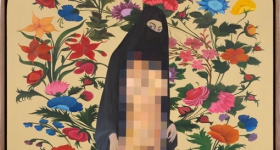Su Hwang’s debut poetry collection Bodega (Milkweed Editions) moves through individual and collective memory as one might move through an actual bodega: fingers running across detergent and snacks in bright packages, delivering greetings to someone from the neighborhood, trying to remember what you came to get in the first place, recalling a memory sparked by the sudden whiff of a familiar smell. Against the backdrop of the early ’90s in Los Angeles, New York in the ’80s, the Korean War and the present, the collection surveys how marginalized people attempt to make sense of an American Dream shattered by racism, xenophobia, income inequality and war, where “crinkled dollarbills [add] up to nothingfast” (“Portrait of Ladymothering”), rookie cops strike nightsticks against the metal fences, “memorizing faces to incarcerate, // eviscerate” (“American Seismology”) and dreams are “not yours to be / shared.” (“Fresh Off the Boat | An Iconography”)
Hwang provides pathways to navigate this difficult terrain — often through the speaker’s childhood memory. The children in this collection are at once wise, sensitive and tough; as Hwang writes in “Duende Essays”: “[b]listering childhoods breed / a certain strain of resilience.” The children’s imagination is not a source of escapism but a way of envisioning another world both out of and within the often-traumatic present; for instance, in “Accumulation,” the white wire hanger used for whipping morphs “into contours / of birds –.” In “Hopscotch,” Hwang invites us to the “invented kingdoms in the alley” that the child speaker constructs between a Baptist church and a synagogue, where they let cherry Kool-Aid run down their faces like blood as they pretend to be vampires. When the child speaker expresses to her friends that she also wants her “hair braided in rows” like them, they reply, “shiny beads / won’t tame such slippery eels!” Despite their differences, the child speaker imagines herself and her friends as “a jolly, three-headed creature forever / conjoined.” These images of monsters and vampires are at once levitous moments captured in a child’s imagination, but they are also telling of the social, economic and racial tensions running beneath the cityscapes within the book. For example, in “Sestina of Koreatown Burning,” which Hwang situates in the “L.A. Riots, 1992”: “Men who looked like my father shattered / after seeing their livelihoods in embers, glass / shards sculped into pistols.” The speaker “pumps [her] teenage fists / for nonviolent ways to shatter // class and color wars,” but admits, “what did I know about the glass / nature of people’s private lives // how we do not always honor the living.”
Many tender moments in the collection revolve around food, whether they concern the family pretending to be royalty sitting in the vinyl booths of Red Lobster or Sizzler, or the mother measuring the water for rice as if “performing a sacrament or taking [the speaker’s] temperature” in order to teach her daughter how to make rice. “The Price of Rice” finds the speaker playing with her food as she glues paper hats together with rice “to pretend I was a nurse mending wounds or / a famous chef summoning feasts.” Even though the speaker “never saved anything in [her] life,” she is aware of the scarcity that belies such apparent abundance and that her mother “us[es] her body / to carry and shield” so that the speaker would never “have to be intimately acquainted with the same // country of hunger.” Earlier in the book, the child speaker states that “we were not the kind of family that said ‘I love you out loud’” (“Eomma”), but these intimate moments over shared food are their own sorts of communions — alternative ways of conveying care.
Despite the pathways that the imagination forges through the detritus of the American dream, Hwang’s vision of love or imagination’s power resists facile warm-fuzziness; it is instead one emboldened and sharpened by sacrifice, resistance and the sometimes heartbreaking reality that the results of what we fight for now might not come to fruition until long after we are able witness them: “Sometimes love is tying a knot in your throat then taking it to the grave. Sometimes it’s hoping against hope that a seed will flower into fable — long after we are gone.” (“Sarangheyo”) Bodega is a stirring debut that testifies to the power of the imagination that glints and glitters among the shards of the American Dream.










Comments